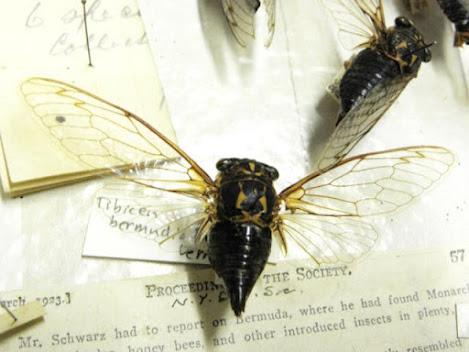 |
Figure 1 Bermuda's Flag Includes the British flag since it is a colony and the Bermuda Coat of arms which shows the sinking of the Sea Venture which led to the first settlement in Bermuda (Rushe) |
Bermuda is considered part of the Caribbean,
even though it is far from the Caribbean region and has many differences in its
history. Unlike many other Caribbean countries there was no native population
before it was colonized. It also was not fought over by European
countries. The Island was not very
desirable, because of the lack of fresh water and stormy climate. The Spanish,
who initially recorded the islands’ location in 1511, considered it to be
cursed according to the CIA World Factbook, “Both Spanish and Portuguese ships
used the islands as a replenishment spot for fresh meat and water, but legends
of spirits and devils, now thought to have stemmed only from the callings of
raucous birds (most likely the Bermuda Petrel, or Cahow), and of perpetual,
storm-wracked conditions (most early visitors arrived under such conditions),
kept them from attempting any permanent settlement on the Isle of Devils” (United States of America Central Intelligence
Agency).
These storms brought the first settlement to Bermuda when the British ship the Sea
Venture wrecked on the coast in 1609 (Rushe). Bermuda was claimed and remains a British territory.
The islands’ Caribbean connection comes
mainly through the Caribbean Natives and African slaves and indentured servants
who were brought to Bermuda primarily from the Caribbean region according to
“Black History in Bermuda” (Bermuda National Trust).
 |
Figure 2 Sarah ’Sally’ Bassett 2009 , was a slave accused of poisoning her masters and sentenced to burn By Carlos Dowling (Bermuda National Trust) |
The stories of the exploitation,
revolution and emancipation of enslaved people is a uniting factor in the
history and politics of the Caribbean region shared by Bermuda. In the early
years of British settlement, from 1612 to 1644, Europeans, Africans and Caribbean
natives came to Bermuda as indentured servants, who could work through a
contract then become a free Bermuda citizen. These black and Caribbean natives
contributed greatly to the survival of Bermuda with their knowledge and skills
“Most came from the West Indies or were seized from Portuguese or Spanish ships
(hence the fact that many had Spanish names). They worked as divers, or as
planters and cultivators of tobacco and sugar cane, and their expert knowledge
proved invaluable to the development of agriculture in Bermuda, as they were
able to pass on their skills to other indentured servants” (Bermuda
National Trust).
As the slave trade grew through the Caribbean region Bermuda adapted this
inhumane practice. Before the 1834 emancipation in all British colonies there
were several failed slave revolts (Bermuda National Trust). Free Black people
were bond by discriminatory laws and segregation that restricted their ability
to trade, vote and prosper in Bermuda both before and after emancipation.
Bermuda through many changes has become
a self-governing British territory with a parliamentary government (Rushe). The governor is the
elected head of the government and works with the elected members of parliament.
Voting laws have changed throughout the
1900’s from women suffrage and the end of the property requirement to vote,
which had prevented many marginalized non-whites from voting. In 1973 the governor,
Sir Richard Sharples was assassinated and riots resulted in efforts to end existing
discrimination (Rushe). Votes for
independence from Britain have never succeed in Bermuda, and Britain gave full
citizenship to all Bermudians in 2002 (Rushe).
Bermuda will likely remain a
British Territory, but has made great strides to be more inclusive of all the
citizens. Progress has been made for working rights and voting rights for
people of color and women in Bermuda. As
Bermuda struggles with the modern problems of population growth and strained resources
the people must work together to ensure their survival.
Works Cited
Bermuda National Trust. Black History in Bermuda
Teacher's Resource Guide. Hamilton, 2016. www.bnt.bm/images/News%20Articles/Black%20History%20Book.pdf. 20 March 2021
Rushe, George. "Bermuda." 10 May 2021. Encyclopaedia
Britannica. www.britannica.com/place/Bermuda. 24 March 2021.
United States of America Central Intelligence
Agency. "Bermuda." 2020. CIA World Factbook. www.ciaworldfactbook.us/north-america/bermuda.html. 24 March 2021.




Comments
Post a Comment